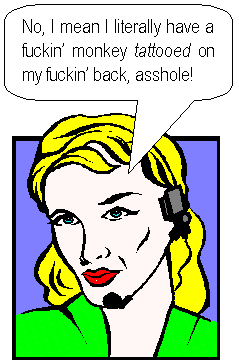 |
In the
last issue we ran a piece on “easy” Japanese. Words that, whether they
are useful
or not, are at least very easy to remember. Keeping in mind
that
Japanese is one of the hardest languages in the world, and many live
here for
years on end and never learn to speak their ways out of a paper bag,
intrepid
linguists (or at least people with good ears) have managed to pinpoint
a few
more Japanese words that are child’s play to pick up. Here’s a few to
try on
for size.
nuts
– summer
phew
– winter
ha-ha
– my mother
Bingo,
Tango, Kinki – regions of Japan
GG
– geezer
A
– picture
Ayyy
– manta ray
 OG
– geezer
OG
– geezer
go
– five
ego
– the game of Go
UB
– finger
CC
– lion
kin
– gold
U2/you
chew - larva
ago
- chin
chin
chin – penis
chew
- kiss
ginger
– Shinto shrine
hen
– strange, bizarre
ten
- heaven
go
- five
cashew
- singer
kooky
– fresh air
shin
- new
G
– hemorrhoids
go
men – sorry, so sorrymen – noodles, mask
hokey
– broom
coma
– top (for spinning)
taco
– octopus
sue
me – charcoal
 |
Names
Many Westerners
arrive in Japan and find out that their names mean things in Japanese.
Sometimes this is a good thing, sometimes this is a very bad thing!
NAMES THAT
SOUND GOOD IN JAPANESE:
Hannah
– flower, nose
June
– pure
May
– eye
Ken
– sword, build, prefecture, etc.
Tyler
– flat
Ben
Lee – convenient
Naomi
– common Japanese girl’s name
Meg
– common Japanese girl’s name
NAMES THAT
SOUND BAD IN JAPANESE:
Nicky
B. – zit
Ben
– dialect, part of the word for toilet
Ben
P. - constipated
Gary
G. Ketts - "buttful of diarrhea and hemorrhoids."
Ben
P. Dasai - 'constipated hick,'
Beth
Nuhaff - 'ugly transvestite,'
Deb
Heather's - 'fat and ugly,'
Hannah
Gee - 'nose bleed'
Hannah
Misou - 'snot.'
Anna
D'Amay – hole forbidden
Sully
O'Tuck - 'pickpocket freak'
Uta
Hetta - 'can't sing a note,' or 'tone deaf,' John Chiquan - 'pervert
dog.'
Confusing
English used in Japan
Just
because it sounds like English, doesn’t mean you’ll be able to
understand what
it means. Here’s a bunch of so-called English terms for you to
contemplate.
They are officially called wasei eigo, which means
“made-in-Japan
English.” Hell, anything can be made in Japan, even language. Use with
caution.
Claxon
– car horn
Consento
– electrical outlet
Cunning
– cheat (on a test)
Cooler
– air conditioner and/or heater
Cutter
Shirts – business shirt
Hip
– bum
Hormone
– guts (or hormones)
Hotchkiss
– stapler
Magic
tape – velcro
Mansion
– apartment
Master
– bartender
New
Half – transvestite/transsexual
Pants
– underwear/panties
Paper driver
– a licensed
non-driver
Potato
fry – French fries
Road
show – film opening
Running
– tank top
Seal
– sticker
Service
– “on the house”
Sharp pen –
mechanical
pencil/propelling pencil
Skinhead
– bald man
Smart
– slim
Snack
– hostess bar
Viking
– buffet
 |
Watch out!
Other trouble words
Yam-cha –
dim sum. From Cantonese,
but we say “dim sum,” also from Cantonese.
Shinkansen –
bullet train. Even fluent English speakers
don’t know
the term “bullet train” and everyone in Japan just assumes that
the word
“shinkansen” is already internationally accepted.
Easy Kanji
There
are no easy kanji (Chinese characters used in Japanese) beyond
the ones
shown in last issue. Buy a good book and study!